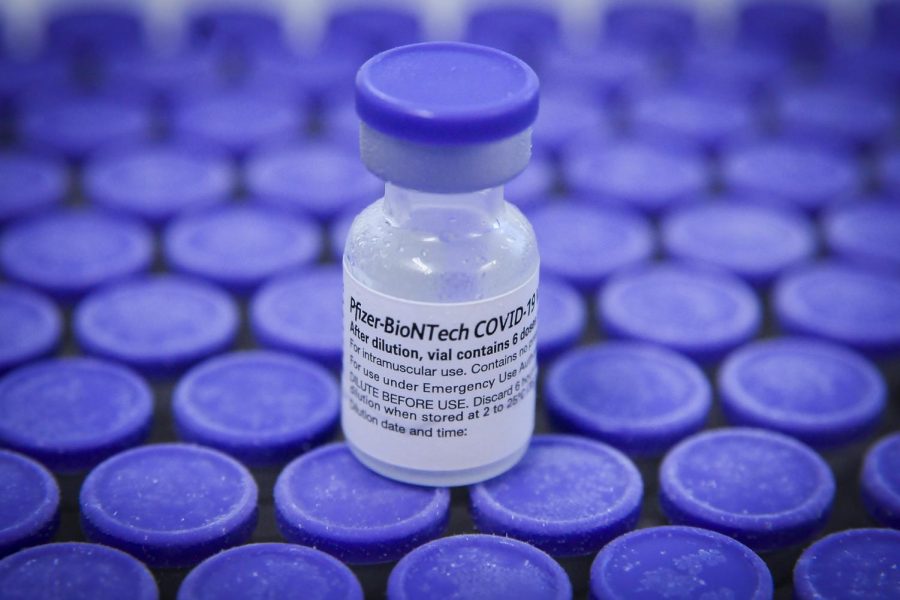New Pfizer antiviral pill shows promising results in new report
December 11, 2021
Pfizer Inc. released study results last month which showed that Paxlovid, an antiviral pill created to combat COVID-19, reduced hospitalization and death in people with the virus by 89%.
The company conducted a 28-day study to test the efficacy of Paxlovid in high-risk adults. The study used 1,219 adults who all had a positive COVID-19 diagnosis, with 607 participants receiving Paxlovid for treatment and the other group of 612 receiving a placebo.
Participants were also “required to have at least one characteristic or underlying medical condition associated with an increased risk of developing severe illness from COVID-19” according to a press release by Pfizer. They were given oral doses of either Paxlovid or a placebo every 12 hours for 5 days.
At the end of the 28-day period, there were 10 reported deaths within the placebo group and none in the Paxlovid group. Within five days of treatment, only six participants in the Paxlovid group were hospitalized compared to the 41 hospitalized in the placebo group.
The effectiveness of Pfizer’s Paxlovid and Merck & Company Inc. and Ridgeback Therapeutics’s molnupiravir, another oral COVID-19 medication, have experts hoping COVID19 antiviral pills will be effective against emerging strains like the omicron variant.
“These data suggest that our oral antiviral candidate, if approved or authorized by regulatory authorities, has the potential to save patients’ lives, reduce the severity of COVID-19 infections, and eliminate up to nine out of ten hospitalizations,” Chairman and Pfizer CEO Albert Bourla said in the press statement.
In order to reduce risk, Paxlovid is meant to be prescribed immediately following the first signs of a COVID-19 infection. Experts say taking Ritonavir, an antiretroviral medication, in combination with Paxlovid will help improve the new pill’s efficiency.
For the new drug to be effective, many experts are advocating for immediate action. Alyssa Bilinski, a public health policy expert at Brown University told The New York Times that efficiency “starts with the public education such that when people start to have mild symptoms, early in the course of their illness, they think, ‘This might be Covid-19, and I should get a test.’” People would need access to testing resources and receive results quickly, ideally within three to five days, for them to take the pills and optimize its protection.
Timing is an important for Paxlovid because the drug works to prevent the replication process of the virus. If the virus completes the replication stage before the pill is taken, the effectiveness of the drug is decreased.
Some COVID-19 tests may also take up to five days to relay results, which can cause people to fall out of the ideal prescription window of the antiviral pill. A supply shortage of rapid antigen tests may be on the horizon if people opt for the faster testing option in lieu of the more accurate PCR test
The virus works in two phases, the first phase being when the virus quickly replicates. Most notice severe symptoms “arising from a defective immune response that gets triggered by the replicating virus,” during the second phase, according to Reuters. By this stage, however, it would be too late to treat the virus with antiviral pills like Paxlovid.
Medical experts worldwide agree that as of right now, the distribution of COVID-19 vaccines should be prioritized.
“Prevention and treatment must go hand in hand,” Dr. Leana Wen said to Fortune. “It’s important to have treatments in case people fall ill, but it’s even better to prevent the disease in the first place.”
Additionally, COVID-19 pill treatments will be difficult considering many people are asymptomatic or exhibit mild symptoms that often go ignored.
Release of the pill to the public is reliant on approval from the U.S. Food and Drug Administration or acquisition of emergency use authorization. Pfizer is currently seeking emergency use authorization for Paxlovid from the FDA.
Those in the U.S. can expect the antiviral pill to be launched as early as within the next few weeks for emergency use and throughout 2022, according to the US Department of Health and Human Services. The Biden Administration has already purchased ten million courses of Paxlovid.








